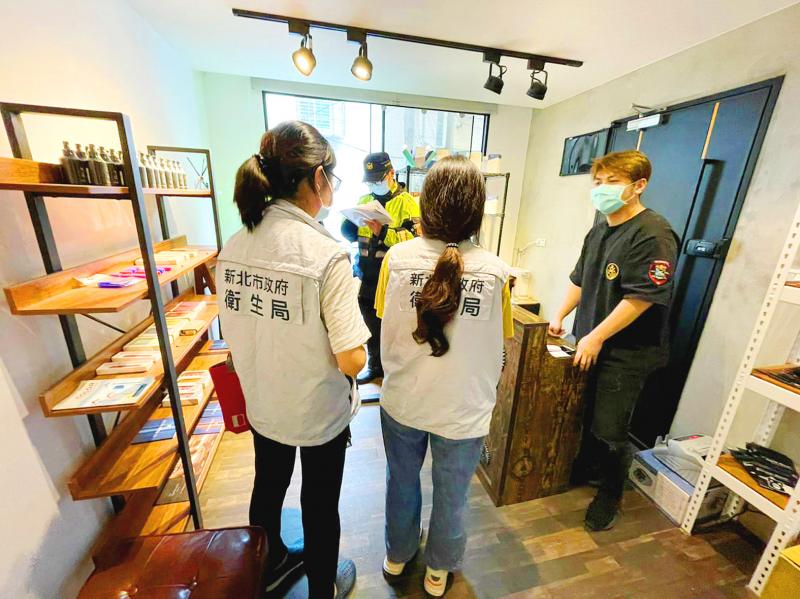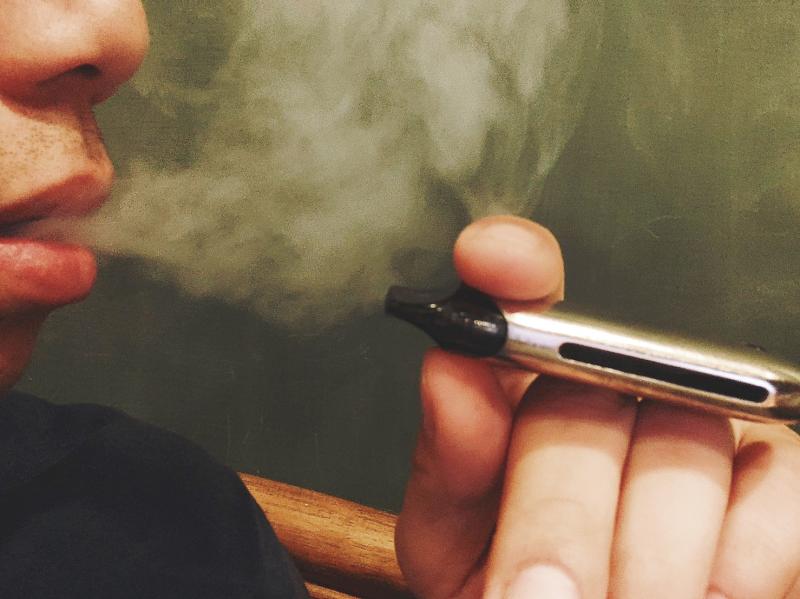Law enforcement and health officials reminded the public that e-cigarettes and using or selling cannabis are illegal in Taiwan, after the arrest of five people in Taipei last week.
Taipei police said over the weekend that they had broken up a criminal organization, whose members have been accused of selling e-cigarette oil containing cannabis extracts.
After surveilling the premises for several days, police officers carried out a raid at a motel in Taipei’s Wanhua District (萬華) last week, in which 94 vaping cartridges and 23 pouches of unknown powdered material were seized.

Photo courtesy of New Taipei City Department of Health
Preliminary lab testing revealed that the cartridges contained cannabidiol (CBD) and tetrahydrocannabinol (THC), the main active ingredients in cannabis. The pouches contained ketamine, which is a controlled substance.
A 25-year-old woman surnamed Liu (劉) allegedly led the criminal ring. One modified handgun, 11 bullets and an undisclosed amount of cash were also seized.
Investigators said that Liu’s group had been selling the vaping cartridge oil for the past year.

Photo: Cheng Ming-hsiang, Taipei Times
The group made an estimated NT$10 million (US$359,544) in illegal proceeds, they said.
The suspects in the case are facing charges of contravening the Narcotics Hazard Prevention Act (毒品危害防治條例), and for possession of illegal firearms in contravention of the Controlling Guns, Ammunition and Knives Act (槍砲彈藥刀械管制條例).
Investigators said that Liu and ring members allegedly promoted their products to young people via social media and online platforms.
The CBD and THC oil were branded as “Cookies,” “Sherbet,” “Dream,” “Skywalker” and other names, they said.
Officials at the Ministry of Health and Welfare yesterday said that e-cigarette and related vaping devices have not been approved in Taiwan, and their use therefore is illegal, regardless of their contents.
When cannabis or other drugs are added to vaping oil, sellers and customers could be charged with contravening the narcotics act, health officials said.
Regarding oils that contain nicotine or tobacco, and promoting such products, sellers and buyers could be indicted under the Tobacco Hazards Prevention Act (菸害防制法) or the Pharmaceutical Affairs Act (藥事法), they added.
CBD in pharmaceutical products has received approval for medicinal use in Taiwan, when prescribed by a physician and the request is approved by authorities.
However, general sale of CBD is not permitted. Such products can contain THC at less than 10 parts per million, but would otherwise be scheduled as a Class 2 illegal drug, officials said.
Ministry of Justice officials said yesterday that e-cigarettes and other vaping devices are being found more commonly on school campuses, often containing cannabis.
Authorities have said that e-cigarettes containing nicotine and tobacco are just as addictive as regular cigarettes.
The chemicals e-cigarettes contain, such as flavoring ingredients, can cause severe and permanent lung diseases within a short period of time, they said.
The ministry has said that it is not considering legalizing or decriminalizing cannabis or other substances.

The manufacture of the remaining 28 M1A2T Abrams tanks Taiwan purchased from the US has recently been completed, and they are expected to be delivered within the next one to two months, a source said yesterday. The Ministry of National Defense is arranging cargo ships to transport the tanks to Taiwan as soon as possible, said the source, who is familiar with the matter. The estimated arrival time ranges from late this month to early next month, the source said. The 28 Abrams tanks make up the third and final batch of a total of 108 tanks, valued at about NT$40.5 billion

Two Taiwanese prosecutors were questioned by Chinese security personnel at their hotel during a trip to China’s Henan Province this month, the Mainland Affairs Council (MAC) said yesterday. The officers had personal information on the prosecutors, including “when they were assigned to their posts, their work locations and job titles,” MAC Deputy Minister and spokesman Liang Wen-chieh (梁文傑) said. On top of asking about their agencies and positions, the officers also questioned the prosecutors about the Cross-Strait Joint Crime-Fighting and Judicial Mutual Assistance Agreement, a pact that serves as the framework for Taiwan-China cooperation on combating crime and providing judicial assistance, Liang

A group from the Taiwanese Designers in Australia association yesterday represented Taiwan at the Midsumma Pride March in Melbourne. The march, held in the St. Kilda suburb, is the city’s largest LGBTQIA+ parade and the flagship event of the annual Midsumma Festival. It attracted more than 45,000 spectators who supported the 400 groups and 10,000 marchers that participated this year, the association said. Taiwanese Designers said they organized a team to march for Taiwan this year, joining politicians, government agencies, professionals and community organizations in showing support for LGBTQIA+ people and diverse communities. As the first country in Asia to legalize same-sex

MOTIVES QUESTIONED The PLA considers Xi’s policies toward Taiwan to be driven by personal considerations rather than military assessment, the Epoch Times reports Chinese President Xi Jinping’s (習近平) latest purge of the Chinese People’s Liberation Army (PLA) leadership might have been prompted by the military’s opposition to plans of invading Taiwan, the Epoch Times said. The Chinese military opposes waging war against Taiwan by a large consensus, putting it at odds with Xi’s vision, the Falun Gong-affiliated daily said in a report on Thursday, citing anonymous sources with insight into the PLA’s inner workings. The opposition is not the opinion of a few generals, but a widely shared view among the PLA cadre, the Epoch Times cited them as saying. “Chinese forces know full well that